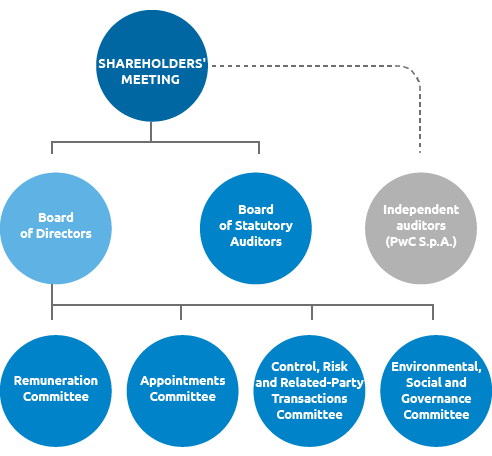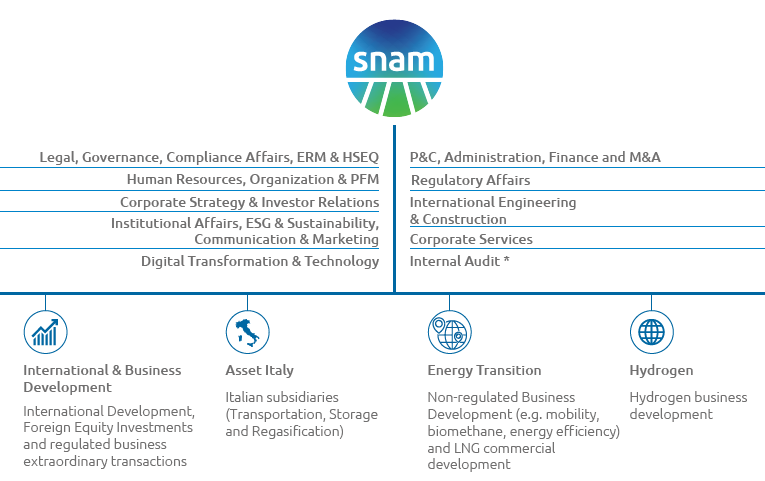Governance and organisation

Snam operates within the framework of the Universal Declaration of Human Rights, the fundamental conventions of the ILO and the OECD Guidelines for Multinational Enterprises, and in compliance with its own Code of Ethics, which is also a key element of the Organisational Model of Legislative Decree 231/2001.
Snam’s governance plays a crucial role in value creation dynamics. It helps to determine the conditions for the Company to interact properly and adequately with its reference environment, in particular by putting into practice the principles of integrity, transparency and compliance with internal and external rules, with the ultimate aim of reconciling the interests of our various stakeholders.
The governance system reflects the ‘traditional’ model and is developed in accordance with the applicable industry regulations (laws governing unbundling and listed companies), while also taking into account national and international best practice.

The acceleration of energy transition and the development of new solutions as part of renewable energy are significant challenges for the Snam Group. As an advocate of change, in line with the strategic plan, the San Group has launched the development of new businesses and continues with the optimisation of processes and the development of its corporate structure.
Snam’s Board of Directors
of the BoD is made up of independent directors*
All the BoD
committees are chaired by
directors
of the BoD is
made up of women
* 5 directors out of 9 who are classified as independent pursuant to the TUF and Code of Corporate Governance and a Chairman classified as independent pursuant to the TUF.
(More detailed information on governance can be found in the document “2019 Report on corporate governance and ownership structure”, which was published online at www.snam.it at the same time as the Annual Report).
(More detailed information on remuneration can be found in the document “2020 Remuneration Report”, published at www.snam.it).

According to the Business Plan, Snam aims to be a pioneer company in energy transition. At the same time, the Company continues to consolidate and makes its organizational and governance systems more efficient in order to support the consolidation of its core business and the growth of new activities.
To achieve these goals during the year the following initiatives, among others, were implemented:
- strengthening the core business to make the infrastructures more modern, safe and sustainable;
- continuous improvement of the efficiency and re-engineering of corporate processes with the aim of both increasing the flexibility of the core business and helping the consolidation of the company in the new businesses;
- reorganisation of the corporate structure with the purpose of facilitating the integration and optimisation of corporate processes.
With regard to what was defined in the last point, the main changes envisaged by the new organisational structure can be summarised as follows:
- the creation of a business unit dedicated to new green activities (biomethane, sustainable mobility and energy efficiency) with the objective of accelerating the integration of the new businesses and energy transition;
- the creation of a business unit dedicated to the development of the hydrogen business, identified by Snam as one of the crucial energy factors for accelerating the fight against climate change and, as a result, contributing to the reduction of emissions with a view to future decarbonisation;
- the creation of a unique business unit dedicated to the development of international businesses, the management of foreign investments and research into new growth opportunities for the core business with the objective of exploiting the existing synergies between the three areas.
To accelerate energy transition and the decarbonisation process further, in 2019 the Snam Group gained control of companies that produce biomethane to invest in infrastructures and the construction of new plants. Specifically, the Snam Group, through the new subsidiary Snam 4 Environment, gained control of around 83% of Renerwaste, one of the leading companies operating in biogas and biomethane infrastructures in Italy.
Snam's organisational model

(*) The Senior Vice President Internal Audit carries out the activities fully independently according to the instructions of the Board of Directors